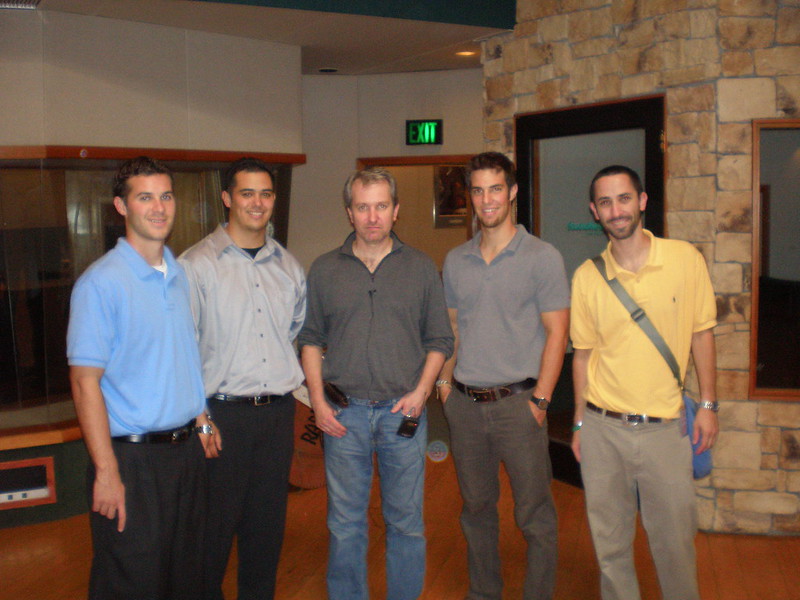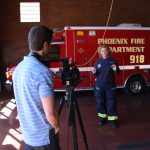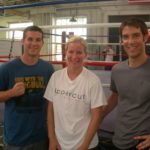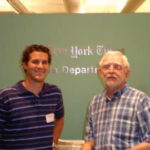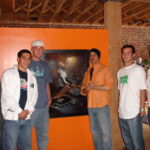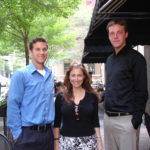Peter Dyson owns a recording studio, but he does not call himself a professional musician or a professional engineer. He instead surrounds himself with the most talented people possible, allowing him to produce music befitting the most established recording studio in San Diego, Studio West. Although Peter has been known to play the drums from time to time, until three years ago, he worked in the semi-conductor industry in Texas, far from his passion for music and the Southern California breeze.
Three years ago, seeing Studio West as a sound investment, he bought the studio, which was established in 1971. Understanding the digital era in which he exists, Peter established a training center at the studio, where, for a reasonable price, aspiring producers, artists and engineers harness the power of home digital recording. Because most musicians never set foot in a studio like those at Studio West, the training program offers an egalitarian sensibility.
Through his dry British wit and accent, Peter’s passion is obvious when speaking of his more “esoteric vintage gear” that has a “certain kind of vibe.” Although that vibe is a bit mysterious, it appears to resonate through the halls of Studio West, where music continues to be nurtured, not only in sprawling studios, but also in the classroom, allowing anyone the chance to record like a professional.
Interview
At 22, where did you think you were going to go in your career?
(Laughs). I enjoyed life. But I can’t tell you I had a clear idear about what I was going to do. Frankly, I’m either extremely impressed, or extremely skeptical of people 18, 19, 20, 21, 22 who say this is who I am and this is what I’m going to do. I think there’s so many things out there that you can do, and often it’s hard to really say what the things are that you want to do until you’ve really experimented with several different things.
It’s a tiny, tiny percentage of the population who know, when they’re seven years old, that they’re going to be a doctor. And they play doctors and nurses, and sure enough they go to medical school and become a doctor. That’s not reality. For the most of us, anyway.
So I wouldn’t say I didn’t have a clue, but it wasn’t my primary focus in my thinking. What am I going to be, what am I going to do? I just kind of dealt with the situations that were in front of me and tried to have fun with them and learn from what I was doing.
Were you very into music at the time?
Yeah. I’ve always been into music. I played. I’m not a professional musician now but I played drums when I was a kid. Played in bands. Played in bands in college. And that’s one thing I would say to people. It’s like, don’t just look for your career options in the things that people hold out there as ‘work.’ Learn through doing the things that you enjoy doing as part of your life. And look for career options in those things. Because if you’re doing something as a hobby, by astherian nature, it’s going to be something that you’re passionate about and care about.
Again, those things change as your life goes on. Your interests develop. Doing stuff is important (Laughs). You know? No one ever found their passion staring at a television screen. Doing stuff. Going out and engaging with people is important. That starts teaching you lessons about what interests you, what doesn’t interest you- all those things.
Nothing happens over night, but over time, those things can be the experiences that you can turn into exciting career options.
So what’s the story behind Studio West? How did this come about?
This studio has been here since 1971. It’s been in this building for over twenty years. It’s a very established studio. It’s the biggest studio in San Diego. Until three years ago, I worked for a semiconductor company. I wasn’t in the studio business as such, but again, looking at turning interests and hobbies into career options. If you look at the kind of stuff I was doing at Motorola with the background in business, business planning, some of the financial stuff…but also, I did a lot of human resource, working with people, leadership development stuff. Taking those different elements and adding on to it with an interest and a passion for music. And recording music.
I built my own recording studio. Started to delve into some of the options that are out there for building software based recording work stations. That got me into the recording thing. Then when I had enough of the corporate thing, I looked at business opportunities given my background and knowledge. Was I going to buy a dry cleaners or a Subway? No. I’m going to do something I’m passionate and care about. Hence, a recording a studio.
But also, through my experience of trying to learn about different recording software programs, it made me aware there was a niche for people who want to learn about recording software. We are actually trying to train people in it. So that’s the business that we’ve developed since I bought the place. This whole thriving business in teaching people recording software. Pro Tools, which is the main recording software platform. Lots of other things.
Is that primarily what you do? A training seminar?
It’s primarily a recording studio. The training stuff we’ve been doing a year and a half. It’s a case of the child is going to outgrow the parent.
Jay and I are actually recording artists of sorts. Do you find that to be something, as home recording takes off, and these softwares become more usable in your own house, there is still a place for studios in the world? Because obviously there is always going to be professional musicians.
There’s always going to be professional musicians who don’t want to go out of somebody’s bedroom. You’re never going to be able to record a choir in your bedroom. You’re never going to be able to record drums in a small space. You can certainly get a really good recording system for $500-$2000 if you’re adding the separate things from your computer. But some of the old esoteric vintage gear…these two mics here are worth about ten thousand bucks each. They’re vintage German mics from the 50’s. They’re would have to be someone crazy to go off and equip their home studio with that kind of stuff. But it does have certain kind of sound and vibe to it. There’s always going to be a place for recording studios.
What’s been the hardest thing in transitioning from corporate America to owning your own business?
No surprise. It’s the white knuckle of owning your own business. You spend half the night awake trying to figure out whether you’re doing the right thing. Are you spending too much money? Are you not doing enough? There’s a certain predictability to life when someone else is signing your wage check. But, if you like a bit of excitement in life, then this is the way to go (Laughs).
But it’s not for everyone, and I’m not sure if it’s even for me, either.
I’ve owned the studio for three years now.
What gives you the greatest thrill?
I look upon it as enabling someone to do their thing. If you’re a creative person, and you got something you want to do, a song to record, an engineer who wants to enable somebody else to do their thing. Where I get my kind of thrill is just making it a seamless experience for them.
I play the drums a bit. I’m not a great drummer.
Do you drum here ever?
A little bit. Hardly at all now, because of the time. But making sure that when another drummer comes in, that everything they need to do their thing without something getting in the way, making sure that’s all taken care of. That’s important. Because then that creative person can really achieve their best potential.
Some of these creative types can be a little skittish. Something can throw them off and it’s like they can never work again. The session is over with. My goal is to not let that happen.
It’s kind of the same with the learning stuff as well. It’s really easy when you’re learning something complex like recording, engineering, some of these software packages. If you can’t get a recording interface to show up on the computer screen, it’s like, you can forget about learning how this dang thing works, you can’t even find the on button for the stupid thing.
I just like removing those roadblocks and trying to make it seamless and smooth for people. It’s more about enabling other people to do stuff. Which is very different from other people’s motivation. Some people in my situation who have owned studios have the big hot shot producer. They have everyone running around making sure that everything is right for them. But my thing is making this a place where creative people can do good stuff.
Who are a couple cool artists that have come in here?
Richard Dreyfus is back in one of the studios at the moment recording a documentary for the Discovery Channel. Shark Week. There was a band in here a couple weeks, Wolf Mother, an Australian band that’s pretty big. Simple Plan. They were here for four or five days while I was away.
Do you have such a reputation now that these artists come to you, or do you have to seek out…
When you acquire an existing business, you dealing with not just what you want the business to be, but the legacy of what the business is. Everyone’s perception. As far as outsiders were concerned, it was Studio West before I bought it, and it was Studio West after I bought it. They have the perception of this place being a jingle factory. That’s what it was built for originally. Recording network music libraries, which you have heard if you’ve listened to the radio in the last year. It wasn’t cutting edge bands doing cutting edge stuff.
So certainly that’s happened here in the past, but part of the legacy that I have to try and change and deal with is convincing people that you can do cool things here. There’s bands, there’s choirs, there’s whatever.
That exists with any business that you buy. You’re not just dealing with what you want to do, you deal with all this stuff that’s happened before you.
So if you could tell yourself one thing, go back to when you were 22 years old, what would you say?
I think it would be to try and learn something from every experience that you have. I haven’t got any earth shattering revelations but I know that most of us stumble through life a little bit. Trying things that work and trying things that don’t work. And just make sure that you learn something from every one of those experiences.
When I left University of London with a degree in history and politics, I just started working for a car company in the middle of London. Just delivering cars around, I thought it would put some money in my pocket for a month or so. I ended up doing it for two years. Whenever someone with a brain shows up in a place like that, they make you assistant manager. I’m like, ‘I’ve only been here for a week. What do you mean I’m assistant manager?’
I ran this car location in London and eventually I snapped to and said, ‘C’mon, you got to get a job related to what you’re interested in.’ But I learned more in those two years about the importance of service and working in a service environment than I could have done than any amount of reading about it.
Guess what? Recording studios are a service business. And I learned that by renting cars to irate Americans in the middle of London.
You can learn something from all the experiences, good and bad.
Internships aren’t about learning what you want to do in life. It’s mostly about what the hell you want to avoid in life. And you don’t know until you experience some of these things.
Noah: That’s what every job up until this point in my life has been.
Right. But it’s not a negative thing. It’s helping you to learn more about yourself.
One other thing I’d recommend in retrospect is, and I’m English, so I’m not good about talking things…you want to keep it all inside if you’re an Englishman, but talking to people about things that you’ve done. In terms of your interests, your career, jobs that you’ve done. Because it’s very hard to learn things about yourself when you’re just internalizing it all. If you can get somebody to listen, it’s almost like holding a mirror up to yourself. And you’re helping that person draw out of you some of the good and the bad about the things that you’ve done.
For college students, the on-campus career counseling are great places for that. Even taking advantage of those as an alumni and also seeking out professional career counseling. Career coach people. When you’re out in the world. That’s a great thing to do. Because it really helps you reflect upon who you are, what you’ve done, what you like, what you don’t like, what you’re good at, what you’re bad at, what you can improve at, what you can improve at but it’s never going to be your job. All these kinds of things.
So are you an instructor?
No.
I’m sure that you’ve talked to people way more interesting than me on this little tour.
Noah: You’d be surprised how many canned speeches we get. A lot of people talk about the fire inside and all these things, and I think you’re the first person in my recollection who actually told us to learn from every experience. Not to avoid bad experiences, but rather to take it all in.
I’m envious of those people with the fire inside. I’m tired inside. When I look at these people who are amazing entrepreneurs, I’ve got a degree of jealousy about them. But most of us aren’t like that. We’re just not. But that doesn’t mean you can’t achieve good things and you can’t live an exciting life and enjoy the type of things you’re doing. It just doesn’t.
That’s another important thing. We’re not all serial entrepreneurs. We don’t have five start-ups under our belt by the time we’re thirty. Again, one of the great things I like about this music thing is that you can live a responsible life, have a good job, have a reasonable salary and have wife and kids and everyone is happy. But then this music thing can be the thing you get to live your dreams. And that satisfies your need to be creative.
Maybe it’s sports. Whatever it is, I don’t see anything wrong with compartmentalizing life where you’ve got your day job that you do and you’re satisfied, but you’ve also got hobbies and passions you pursue outside of your work that really fulfill that other kind of need.
Any career is about what you’re good at. It’s about the skills that you’ve got. It’s about the interests that you’ve got. But it’s also about values.
I’ve got a wife and two children. It’s important to me that I see them regularly. So I couldn’t have done some of the crazy way out things that I wanted to do at some point in my life. Because you have to live responsibly.
Zach: Regardless of being a serial entrepreneur, there’s an entrepreneurial spirit you must have because it’s still risky to go out and buy a business and do something on your own.
Yeah, but I think that’s more about the belief in the idea being right. By nature, I’m a fairly risk adverse person, which is not the definition of an entrepreneur. But if you really think you have a good idea, and you do some of the research and the leg work to back that up, so you make sure you’re not going out on a crazy kind of a whim, then I wouldn’t say it doesn’t feel like there’s no risk involved, but it’s like you see the risk, but you see the potential reward. That’s what would describe me in this situation.
Zach: So it’s a very calculated risk.
Calculated. That’s a good word. It’s a fairly calculated risk. A lot of spreadsheets have led me to where I am today.
Noah: So this is what a recording studio looks like. I’ve been standing in a closet for the last five years.

